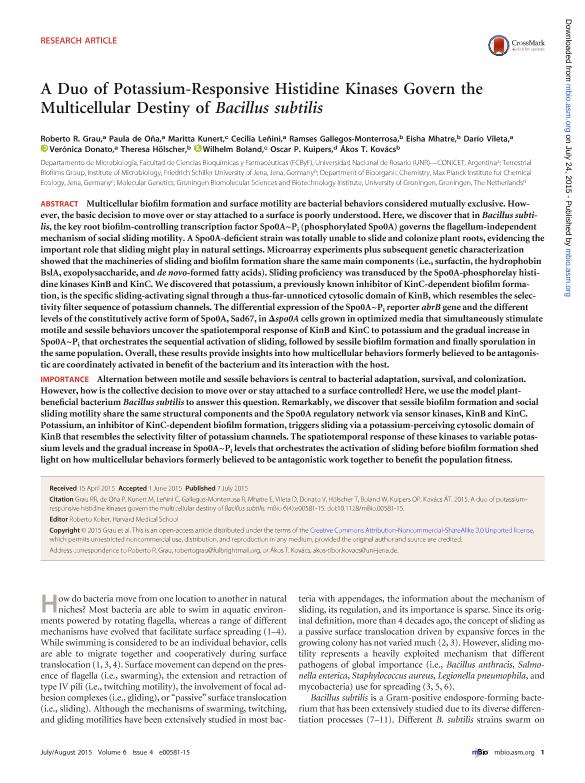Artículo
A duo of Potassium-responsive Histidine Kinases govern the multicellular destiny of Bacillus subtilis
Grau, Roberto Ricardo ; de Oña, Paula
; de Oña, Paula ; Kunert, Maritta; Leñini, Cecilia Andrea
; Kunert, Maritta; Leñini, Cecilia Andrea ; Gallegos Monterrosa, Ramses; Mhatre, Eisha; Vileta, Darío; Donato, Veronica
; Gallegos Monterrosa, Ramses; Mhatre, Eisha; Vileta, Darío; Donato, Veronica ; Hölscher, Theresa; Boland, Wilhem; Kuipers, Oscar P.; Kovács, Ákos T.
; Hölscher, Theresa; Boland, Wilhem; Kuipers, Oscar P.; Kovács, Ákos T.
 ; de Oña, Paula
; de Oña, Paula ; Kunert, Maritta; Leñini, Cecilia Andrea
; Kunert, Maritta; Leñini, Cecilia Andrea ; Gallegos Monterrosa, Ramses; Mhatre, Eisha; Vileta, Darío; Donato, Veronica
; Gallegos Monterrosa, Ramses; Mhatre, Eisha; Vileta, Darío; Donato, Veronica ; Hölscher, Theresa; Boland, Wilhem; Kuipers, Oscar P.; Kovács, Ákos T.
; Hölscher, Theresa; Boland, Wilhem; Kuipers, Oscar P.; Kovács, Ákos T.
Fecha de publicación:
07/2015
Editorial:
American Society for Microbiology
Revista:
mBio
e-ISSN:
2150-7511
Idioma:
Inglés
Tipo de recurso:
Artículo publicado
Clasificación temática:
Resumen
Multicellular biofilm formation and surface motility are bacterial behaviors considered mutually exclusive. However, the basic decision to move over or stay attached to a surface is poorly understood. Here, we discover that in Bacillus subtilis, the key root biofilm-controlling transcription factor Spo0A~Pi (phosphorylated Spo0A) governs the flagellum-independent mechanism of social sliding motility. A Spo0A-deficient strain was totally unable to slide and colonize plant roots, evidencing the important role that sliding might play in natural settings. Microarray experiments plus subsequent genetic characterization showed that the machineries of sliding and biofilm formation share the same main components (i.e., surfactin, the hydrophobin BslA, exopolysaccharide, and de novo-formed fatty acids). Sliding proficiency was transduced by the Spo0A-phosphorelay histidine kinases KinB and KinC. We discovered that potassium, a previously known inhibitor of KinC-dependent biofilm formation, is the specific sliding-activating signal through a thus-far-unnoticed cytosolic domain of KinB, which resembles the selectivity filter sequence of potassium channels. The differential expression of the Spo0A~Pi reporter abrB gene and the different levels of the constitutively active form of Spo0A, Sad67, in Δspo0A cells grown in optimized media that simultaneously stimulate motile and sessile behaviors uncover the spatiotemporal response of KinB and KinC to potassium and the gradual increase in Spo0A~Pi that orchestrates the sequential activation of sliding, followed by sessile biofilm formation and finally sporulation in the same population. Overall, these results provide insights into how multicellular behaviors formerly believed to be antagonistic are coordinately activated in benefit of the bacterium and its interaction with the host.
Archivos asociados
Licencia
Identificadores
Colecciones
Articulos(CCT - ROSARIO)
Articulos de CTRO.CIENTIFICO TECNOL.CONICET - ROSARIO
Articulos de CTRO.CIENTIFICO TECNOL.CONICET - ROSARIO
Citación
Grau, Roberto Ricardo; de Oña, Paula; Kunert, Maritta; Leñini, Cecilia Andrea; Gallegos Monterrosa, Ramses; et al.; A duo of Potassium-responsive Histidine Kinases govern the multicellular destiny of Bacillus subtilis; American Society for Microbiology; mBio; 6; 4; 7-2015; 1-16; e00581-15
Compartir
Altmétricas



